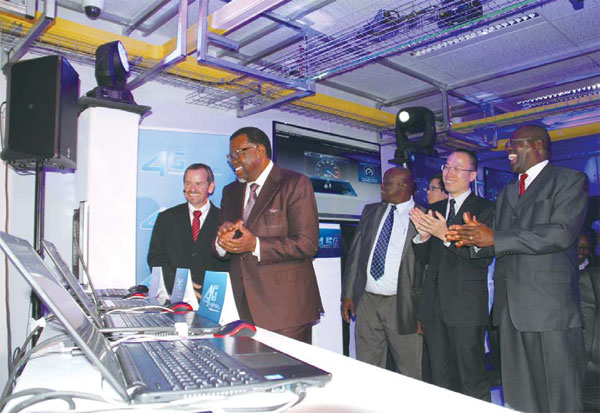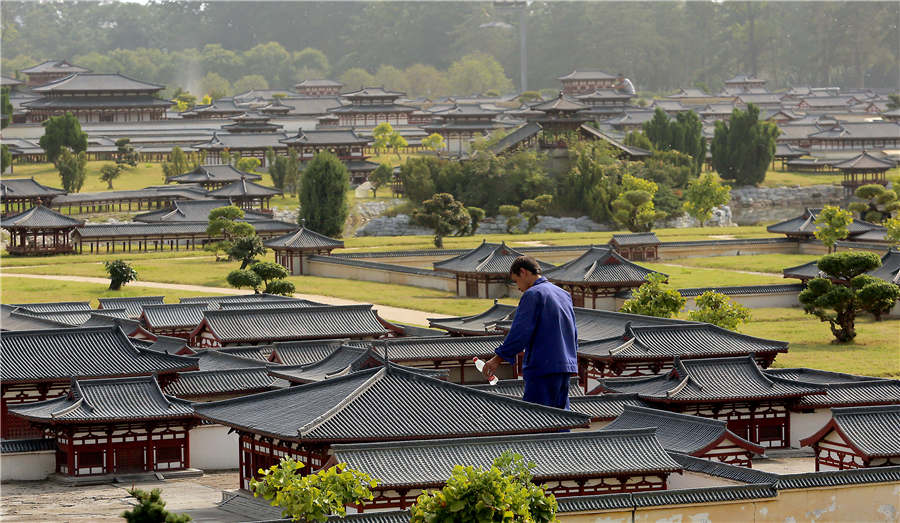Closing the broadband gap in Asia-Pacific
Updated: 2016-09-29 07:56
By Shamshad Akhtar(China Daily)
|
|||||||||
 |
|
Namibian President hage geingob (second left) participated in a 4.5G network test by Huawei Technology in Windhoek.[Photo/Xinhua] |
Advances in information and communication technology (ICT) have been instrumental in shaping and leading socioeconomic transformations across Asia and the Pacific. One key to this transformation is the technology bundled around the "Internet of Things", which enables billions of devices to connect over the internet for more accurate, real time data collection and analysis on an unparalleled scale. Through internet-connected sensors attached to infrastructure, early-on maintenance alarms can be raised for problems, such as defects or wear and tear, thereby potentially saving the lives of people using them.
Despite the spotlight on the capabilities of technologies such as the IoT, the Asia-Pacific region suffers from a lack of ICT connectivity, and the digital divide continues to be one of the largest in the world. The Sustainable Development Goals acknowledge ICT as a development enabler and the foundational infrastructure for achieving sustainable development. In this context, enhancing access to affordable, reliable and robust broadband connectivity must be seen as a prerequisite for accelerated and inclusive development in the Asia-Pacific region.
A fundamental challenge related to ICT advancements is how to best connect those who are still unconnected, so that they too can reap the benefits. The United Nations Economic and Social Commission for Asia and the Pacific underscored the need to address this challenge in a recent report titled the "State of ICT in Asia and the Pacific 2016: Uncovering the Widening Broadband Divide". The report highlights the alarming disparity in broadband connectivity in the Asia-Pacific, with high-income countries experiencing a higher growth rate of broadband penetration relative to other countries.
Twenty countries in the region have only 2 percent of fixed broadband subscription per 100 inhabitants, while ICT champions such as the Republic of Korea, enjoy over 40 percent broadband penetration. Further emphasizing regional disparities, 75 percent of fixed broadband subscriptions were registered in North and Northeast Asia, mainly in China, the ROK and Japan.
Broadband connectivity, especially reliable, affordable and resilient fixed broadband infrastructure, is a critical foundation which supports initiatives that are essential for the achievement of the SDGs, ranging from traffic and transport management, to smart power management, trade facilitation, disaster management and financial inclusion.
While success stories in e-commerce abound, such as China's Alibaba, less is known about the use of ICT for socioeconomic benefits, such as mobile money in Pakistan and the Philippines where salaries and remittances are sent over mobile phones. Farmers and rural residents increasingly use the internet, allowing them to gain unparalleled access to information and helping to further develop multiple sectors, such as agriculture, education and healthcare.
ICT also plays a crucial role in disaster management. When a disaster strikes, it is the telecom infrastructure that provides the platform to communicate with those in need and collect data on damage to facilitate rescue, relief and reconstruction operations. The Asia-Pacific, however, is particularly vulnerable to frequent natural disasters. Earthquakes, for instance, have disrupted submarine cables and subsequently access to the internet in densely populated coastal areas and cities. The region urgently needs to improve and expand its broadband connectivity to provide alternative routes and networks to build greater regional resilience to disasters.
In this context, ESCAP supports the Asia-Pacific Information Superhighway, a regional broadband connectivity initiative that aims to enhance connectivity from Turkey to Kiribati in a holistic manner, through effective internet traffic management, e-resilience and inclusive broadband access.
ESCAP's Committee on ICT, Science, Technology and Innovation, scheduled for Oct 5-7 in Bangkok, also provides an intergovernmental platform to engage member countries and other stakeholders in discussions contributing to a regional vision of what ICT can and should do for the region's future. It is imperative that we enhance connectivity, because without effective and viable "people connections," the region's full potential will not be realized.
The author is UN under-secretary-general and executive secretary of ESCAP, and has been the UN's sherpa for the G20 and governor of the Central Bank of Pakistan and vice-president of the MENA Region of the World Bank.
- Boy with leukemia overcomes lonely hospital trips, keeps studying
- Foreign eyes offer new view of the Long March
- Visitors return to old nuclear facility in Chongqing
- Great Wall's image hurt by repair work, officials say
- Students 'die' to get closer to each other in Hangzhou
- Russian ice creams hot in China

 Real life 'Transformer' car turns into robot
Real life 'Transformer' car turns into robot
 Israel's ex-president Peres dies at 93
Israel's ex-president Peres dies at 93
 New Mao Zedong's portrait graces Tian'anmen
New Mao Zedong's portrait graces Tian'anmen
 Clinton, Trump go head to head in high stakes presidential debate
Clinton, Trump go head to head in high stakes presidential debate
 Miniature replica of Daming Palace shows craftsmanship
Miniature replica of Daming Palace shows craftsmanship
 Elderly man creates map of China with colorful rice
Elderly man creates map of China with colorful rice
 Students 'die' to get closer to each other in Hangzhou
Students 'die' to get closer to each other in Hangzhou
 Classic autos debut at Beijing Design Week
Classic autos debut at Beijing Design Week
Most Viewed
Editor's Picks

|

|

|

|

|

|
Today's Top News
Trump outlines anti-terror plan, proposing extreme vetting for immigrants
Phelps puts spotlight on cupping
US launches airstrikes against IS targets in Libya's Sirte
Ministry slams US-Korean THAAD deployment
Two police officers shot at protest in Dallas
Abe's blame game reveals his policies failing to get results
Ending wildlife trafficking must be policy priority in Asia
Effects of supply-side reform take time to be seen
US Weekly

|

|









